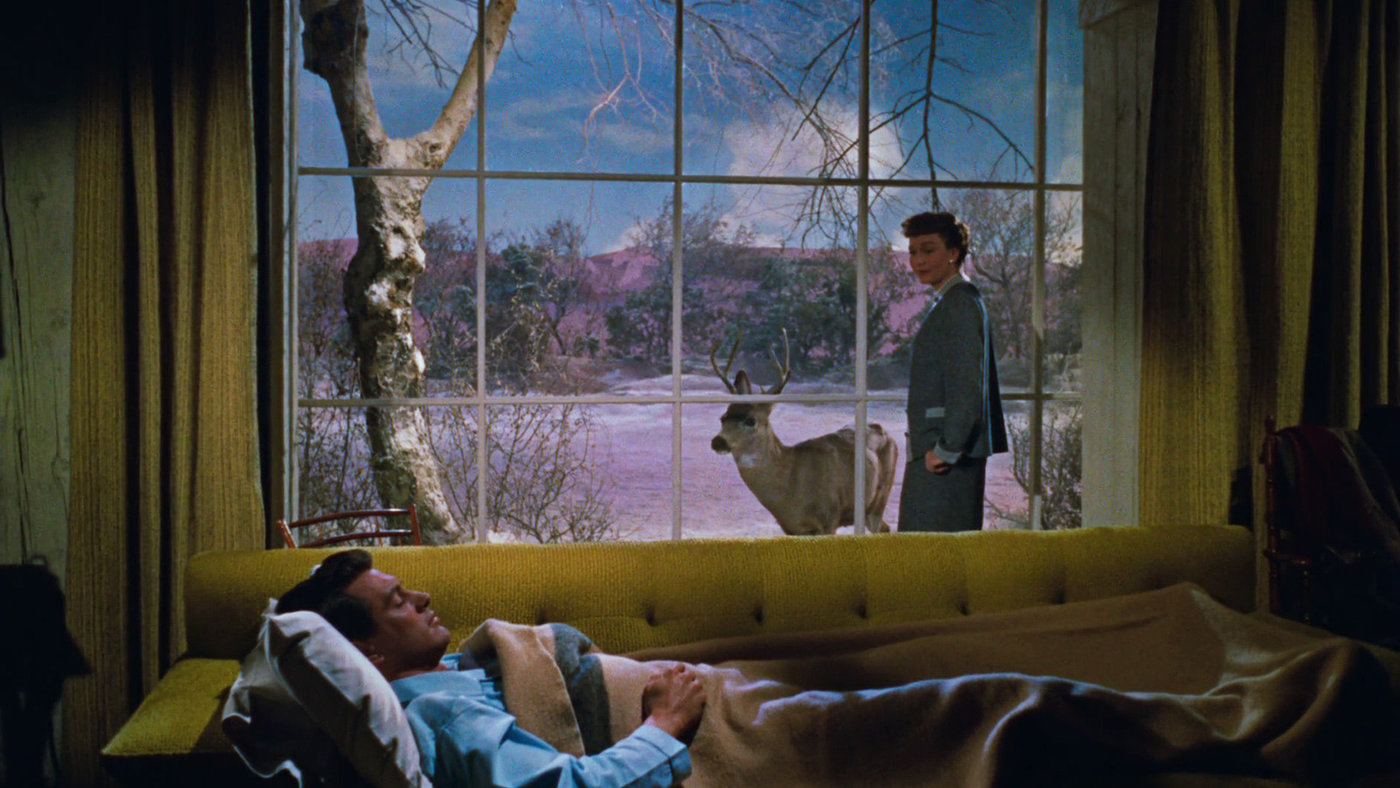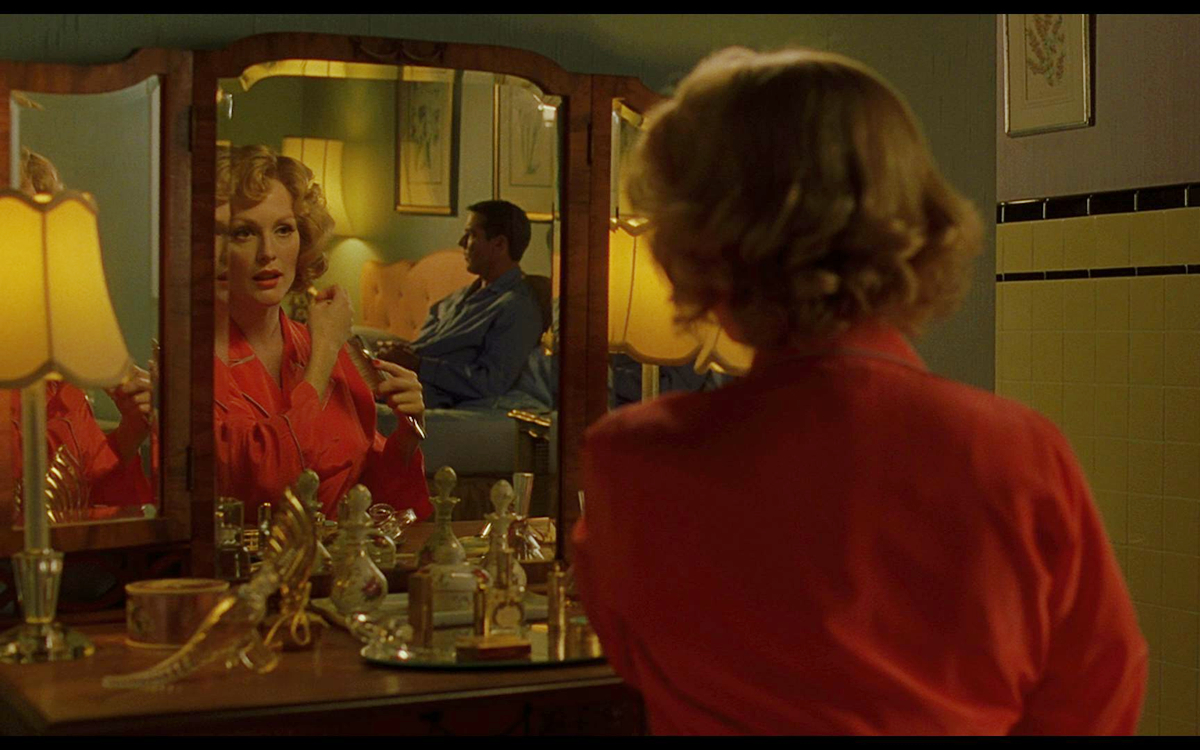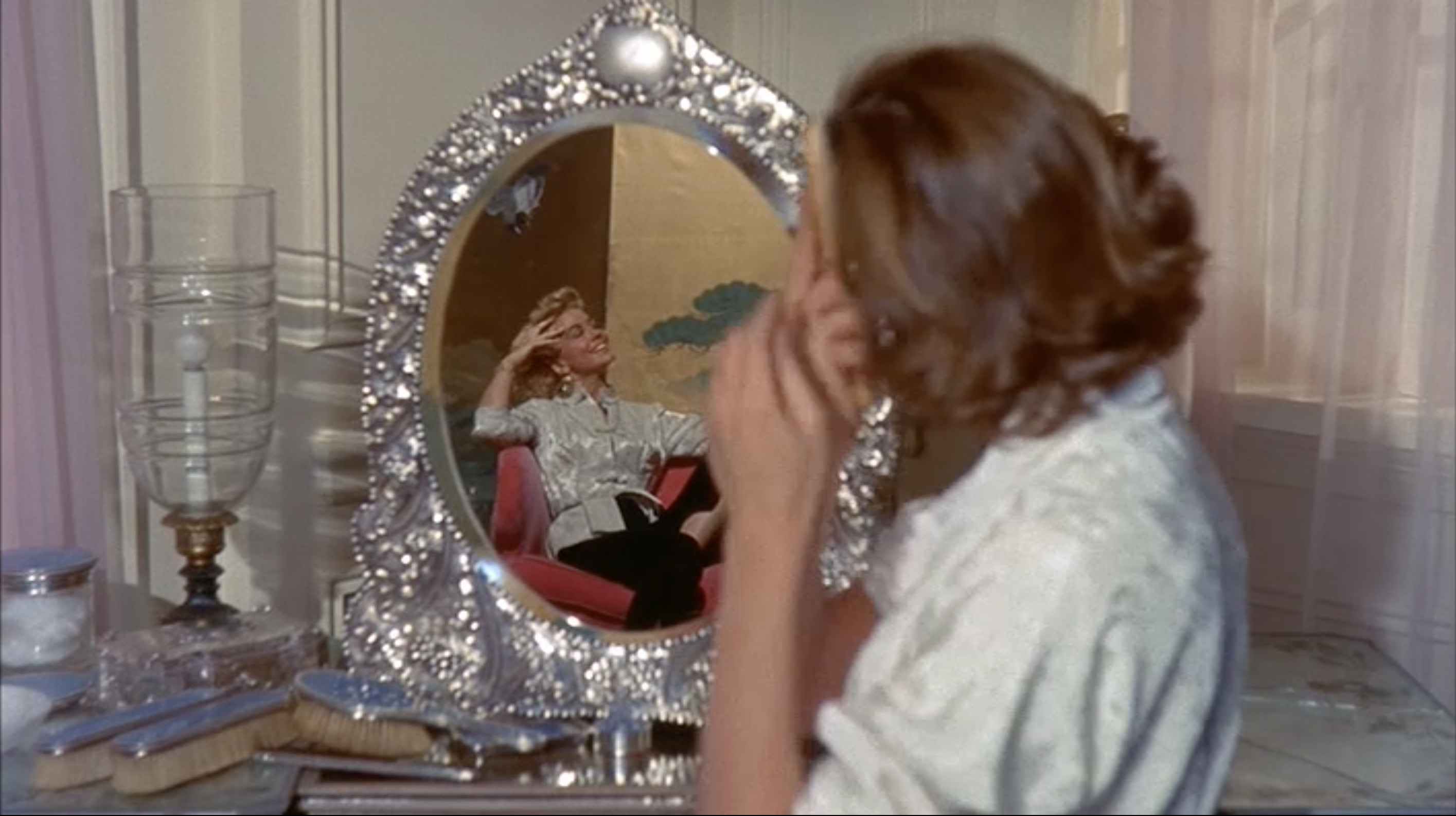
Douglas Sirk's America
As a part of Tarnished Angels: Douglas Sirk’s America, we will be showing several of Sirk’s well known melodramas, as well as one of the films most explicitly inspired by his work, Todd Haynes’ Far from Heaven. The title itself is a reference to one of Sirk’s films, All That Heaven Allows. Mubi Notebook recounts the significance of the titles in an interview with Todd Haynes:
The studio loved the title All That Heaven Allows,” Douglas Sirk remarked (in John Holiday’s interview book Sirk on Sirk) of the second Jane Wyman/Rock Hudson vehicle he made for Universal in 1955, a project assigned to him after the box office windfall of Magnificent Obsession (1953). “They thought it meant you could have everything you wanted. I meant it exactly the other way round. As far as I am concerned, heaven is stingy.” The irony coursing through Sirk’s films was something that went largely unnoticed during his years in Hollywood, obscured—in the most popular of them—by lavish Technicolor and the soapy narrative trappings of the woman’s weepie. It was not until the late sixties, a decade after the German emigré had ditched California, and filmmaking, for the medicinal climes of Lugano, Switzerland, that the crueller contours of his work started to come into focus.
Todd Haynes would forgo any such prevarication in titling his pitch-perfect homage to Sirk, Far from Heaven(2002). A riff on All That Heaven Allows—with elements borrowed from Written on the Wind (1956) and Imitation of Life (1959), as well as Rainer Werner Fassbinder’s Sirk homage, Ali: Fear Eats the Soul (1974)–the film signals the limitations of its Eisenhower-era New England petri dish from the outset. Haynes was unwilling to pretend—to pretend to pretend?—that Julianne Moore’s primped-and-proper white housewife might find lasting happiness in the arms of her gardener, Dennis Haysbert’s gentle, modern art-loving Black man. Too great are the chasms of race and class that divide them, in the eyes of Moore’s country club set at least. But Far from Heaven, a breakthrough for Haynes (his fourth feature, again demonstrating him to be the most chameleonic stylist of the New Queer Cinema), comes equipped with its own Sirkian feint in the form of the period setting: In taking place in the past, it distinguishes itself from both All That Heaven Allows and Fear Eats the Soul. It’s tempting to imagine the social progress made in the half century between Far from Heaven’s 1950s and its release date as the paratextual happy ending to Haynes’s tangle of retro-tinted repressions. Whether you can find comfort in such a reading depends, in some sense, on how stingy your idea of heaven is.
Haynes is quoted in the interview as saying:
still, every time I see one of his films, I’m learning—most directors I speak to feel that way about Sirk. Because he’s sort of a second generation or later-to-arrive auteur—now, of course, it’s not in question—but because of that, it might be more surprising to feel like you’re going to constantly be astonished. So it was a real homage and a real, like, genuflecting to Sirk as a craftsperson and the way that translated into very specific ideas about American life, and female subjects, and the limits of freedom within our ideal settings.
In an interview with Film Comment from 1978, James Harvey describes the difficulty with interpreting Sirk both in films and in their meeting:
Sirk is a unique figure, and most of our ways of talking about him so far have not nearly begun to get at that uniqueness. If he is a major director, as I believe he is, it is importantly because his best work is not easy to like or to come to terms with. But at the least, the mirror-reversals of his surfaces, the almost Nabokov-like density of some of his textures, expand our sense of what is possible in art, and of what is duplicitous too. His films can have an almost unique troubling force. The relation of Robert Stack’s pain to the formal strategies that surround it in Written on the Wind is one of the most disturbing arrangements in modern film—the gesture of both generous and a powerful artist.
Sirk requested that I not use a tape recorder; he believed it inhibited spontaneity. He said he would prefer that I take notes as we talked. He assured me that he would show “the utmost patience” with my note-taking; and he did. What follows preserves the sense and the shape, and—I hope—some of the feeling and sound of the conversation.

The Film Comment interview goes on to discuss Sirk’s departure from Hollywood:
Was the recognition a satisfaction at all?
No, I don’t think so. Not much. Anyway you are never satisfied with your own work. Oh, a small satisfaction maybe. The real satisfaction is yourself knowing you have succeeded. Perhaps for that one moment you believe in yourself wholly.
There is a certain kind of artist—the reckless genius. He just shrugs all setbacks off, he is so ultimately convinced that he is bound to succeed. Now Fassbinder has that. I’m not necessarily saying he’s a genius—but I personally think he is—but he has that kind of confidence in his own talent. And in Germany, he needs it.
The Germans are specially unforgiving to anyone who leaves. When Fritz Lang came back they cut him to pieces. And Marlene Dietrich—who is not only a great star you know, but a great woman—told me in Hollywood after her German music hall tour, that she would never go back again. And I don’t think she has. Now I understand they have made a very vicious film about her.
Or take the case of Remarque in Germany. I don’t know what you think of his work—maybe it’s good, maybe it’s not so good—but there is one fact about it. Remarque was the one German writer who was known from Tokyo to Paris—he represented Germany to the world. But the Germans never forgave him for leaving.
You said before that the real satisfaction comes from knowing you’ve succeeded. Do you recall having that satisfaction while you were in Hollywood?
I don’t think so. I believe the satisfaction being felt was by Mrs. Sirk mostly. I’m a skeptic—by temperament I’m a pessimist. Of course there are rare moments. Certainly I felt some satisfaction of a kind when the president of Universal told me they were all indebted to me—for giving them the biggest moneymaker in their history. How almost a whole people could switch from one moment to the next, almost completely. The younger people one could forgive perhaps—the attraction of something new, etcetera. But the older people—and the intellectuals. Because without the intellectuals, Hitler might never have made it to power.
That’s just the point at which you chose to leave Hollywood.
I couldn’t go on making those Ross Hunter pictures. I needed more freedom. The Utrillo picture was my way out—my French bridge to something else, I thought. Then I got ill. Which I took as a sign that I should get out of the picture business. Always, you know, my mind listens to my body, and my body listens to my mind. That’s why I’ve survived so many tyrannies. Even Hollywood.
Sometimes I think the whole Hitler thing changed me into something I might not have been otherwise. As you know, my wife is Jewish. And basically all my friends turned against me when Hitler came to power. And I still don’t understand it. I will never understand it.
How almost a whole people could switch from one moment to the next, almost completely. The younger people one could forgive perhaps—the attraction of something new, etcetera. But the older people—and the intellectuals. Because without the intellectuals, Hitler might never have made it to power.
There was a historian of importance, some twenty years older than I was—but a close friend in those days, and a liberal. He gave a dinner party, which Mrs. Sirk and I attended. And another friend, a pianist, was playing for us, when this man’s son came in. We knew this young man, he was an assessor of law—but we weren’t prepared for what we saw that night. He was wearing an SA uniform. I can still see the glaring red and yellow of that awful uniform. “Heil Hitler,” he said, he saluted us and went out. Then his father—and he knew exactly what he was saying—smiled at us and said, “He looks wonderful in his uniform, doesn’t he?”
As I say, I still don’t understand. It seems even now so incredible. A nightmare. And then too, my career was really broken by the events of those years. If you are a writer, maybe you can wait things out. But if you are a director, it’s different.
To read the full interview, click here.
Below is another interview from Sirk. If the video does not appear on the page, please click here to see it.

The critic Jonathan Rosenbaum wrote about Far From Heaven and All That Heaven Allows as a sort of film program that would show them together, suggesting that the films inform each other. Read part of Rosenbaum’s review below:
If we had an enlightened film culture that extended beyond outlets such as Tower Records and Virgin Megastore to multiplexes such as Landmark’s Century Centre (which are, after all, fed by the same conglomerates), we’d have a rerelease of All That Heaven Allows to accompany Far From Heaven — not only because Haynes’s movie is an imaginative rethinking and recasting of Sirk’s, but because the two films inform each other in numerous ways. Sirk’s film is about an upscale suburban widow (Jane Wyman) successfully bucking her two kids’ and her community’s disapproval of her romance with her gardener (Rock Hudson), a much younger man; Far From Heaven is about a suburban woman, married to a closeted gay executive and with two kids, who fails to buck her community’s disapproval of her potential romance with her black gardener.
Haynes is especially good at capturing the implication behind every glossy magazine illustration ideal that we’re all being watched by someone or something — a key tool for oppression during the complacent Eisenhower years. One reason Sirk may have started and ended many of his pictures with God’s-eye views of buildings and foliage was to establish a feeling of hushed religious awe that could imply paranoia. The pointedly titled Far From Heaven properly, if paradoxically, begins in the autumnal treetops — as close to heaven as the movie cares to go — before craning down to Hartford, Connecticut, and environs in the mid-50s, and inevitably concludes 107 minutes later with a crane moving upward toward the first spring blossoms.
The kitschy sense of beauty and reverence that comes from these high camera angles also announces that the necessity of being seen — and, more important, surveyed — is an essential part of this apparent state of grace. That your appearance and behavior are read by your neighbors as if they were details on a map makes visible transgressions the only truly risky ones.
Like Haynes, Sirk himself was drawn to referential titles, as can be seen with his remake of Imitation of Life. His alteration of the story shaped the subtext into a more obvious commentary on race in America through the lives of two women, as J. Hoberman argues for The New York Times:
“I would have made the picture just for the title,” Douglas Sirk said of his last Hollywood production, “Imitation of Life” (1959).
Sirk’s wide-screen, flaming Eastmancolor remake emphasizes the key elements of the earlier film but, eliminating the anticapitalist and feminist subtexts, renders the theme of racial exploitation all the more existential and horrific. Here the white heroine, Lora Meredith (Lana Turner) is an aspiring actress with her black counterpart, Annie Johnson (Juanita Moore), downgraded from corporate asset to live-in domestic servant.
Her helmet of platinum hair permed, lacquered and tortured into a pompadour, Lora is relentless in her self-dramatization — visually and otherwise. Falsity is piled on falsity. Beginning with the cascade of costume jewels featured in the opening credit sequence, with the Nat King Cole sound-alike Earl Grant singing the theme, the movie revels in tawdry glamour and stylized phoniness.
Mise-en-scène rules; the objective correlative runs amok. Lora and her equally ultra-blond daughter, Susie (Sandra Dee), a crinoline-clad creature inhabiting the world’s pinkest bedroom, are the embodiment of white privilege and clueless self-absorption. “It never occurred to me that you had any friends,” Lora tells her faithful Annie at one point.
The sense of Brechtian alienation produced by Moore’s masklike, near-perpetual smile is matched by having a white actress (Susan Kohner) play her daughter, Sarah Jane. A seemingly white person compelled to pass for black, Sarah Jane is expected to serve Miss Lora’s guests, date chauffeurs and attend a college for “colored teachers.” She’s beaten by a white beau (Troy Donahue) who discovers her racial heritage, and suffers another sort of emotional brutalization at the hands of her saintly mother.

